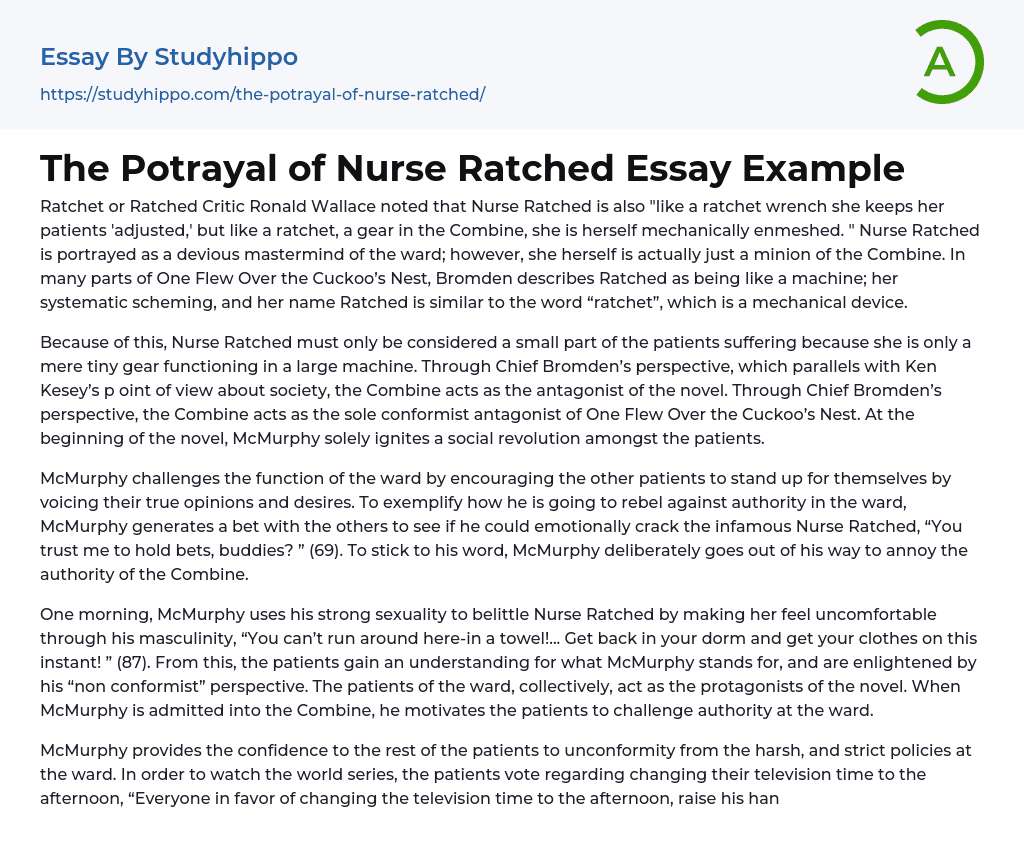Ratchet or Ratched Critic Ronald Wallace noted that Nurse Ratched is also "like a ratchet wrench she keeps her patients 'adjusted,' but like a ratchet, a gear in the Combine, she is herself mechanically enmeshed. " Nurse Ratched is portrayed as a devious mastermind of the ward; however, she herself is actually just a minion of the Combine. In many parts of One Flew Over the Cuckoo’s Nest, Bromden describes Ratched as being like a machine; her systematic scheming, and her name Ratched is similar to the word “ratchet”, which is a mechanical device.
Because of this, Nurse Ratched must only be considered a small part of the patients suffering because she is only a mere tiny gear functioning in a large machine. Through Chief Bromden’s perspective, which parallels with Ken Kesey’s p oint of view about society, the
...Combine acts as the antagonist of the novel. Through Chief Bromden’s perspective, the Combine acts as the sole conformist antagonist of One Flew Over the Cuckoo’s Nest. At the beginning of the novel, McMurphy solely ignites a social revolution amongst the patients.
McMurphy challenges the function of the ward by encouraging the other patients to stand up for themselves by voicing their true opinions and desires. To exemplify how he is going to rebel against authority in the ward, McMurphy generates a bet with the others to see if he could emotionally crack the infamous Nurse Ratched, “You trust me to hold bets, buddies? ” (69). To stick to his word, McMurphy deliberately goes out of his way to annoy the authority of the Combine.
One morning, McMurphy uses his strong sexuality to
belittle Nurse Ratched by making her feel uncomfortable through his masculinity, “You can’t run around here-in a towel!... Get back in your dorm and get your clothes on this instant! ” (87). From this, the patients gain an understanding for what McMurphy stands for, and are enlightened by his “non conformist” perspective. The patients of the ward, collectively, act as the protagonists of the novel. When McMurphy is admitted into the Combine, he motivates the patients to challenge authority at the ward.
McMurphy provides the confidence to the rest of the patients to unconformity from the harsh, and strict policies at the ward. In order to watch the world series, the patients vote regarding changing their television time to the afternoon, “Everyone in favor of changing the television time to the afternoon, raise his hand,” (124). Eventually, the meeting is quickly adjourned by Big Nurse, and she disregards the patients desire to watch the World Series.
To get back at her, when the big game is on air, the patients silently protest by watching a blank television “And we’re all sitting there, lined up in front of that blanked out TV set, watching the grey screen just like we could see the baseball game clear as day... ” (128). To challenge the conformity of the ward, the patients, in this case sit in front of the television when they are not permitted to by Big Nurse. As the novel continues, the patients begin to go to more severe measures to beat their burdening conformity of the Combine.
At the ward, Dr. Spivey grants the patients permission to go on a fishing trip
with each other. When all the patients signed up for the trip finally reach the docks, the captain of the boat does not let them on because he does not have a signed waiver filled out for them. When he leaves, McMurphy leads the rest onto the boat anyway “Pile in, crew, it’s all set! Gassed and ready and there’s bait and beer on board,” (206). Not only are the patients challenging the rules of the Combine, but they are also challenging the rules of their outside world.
They display their non-conformist characteristics when they do not follow general authority. Breaking the law greatly parallels with Kesey’s negative point of view about the American government, and how it forces people to conform to something they are not. Kesey was also an advocate for abusing substances and self experimentation; as the patients get more and more successful in challenging the Combine, they gain magnificent amounts of confidence to abuse drugs.
Kesey was a strong advocate for individualism and self discoveration. His writing portrays his opinion on how individuals “conform” by unconsciously falling to society’s needs. When this novel was written, society ostracized individuals who were thought to be abnormal or different, and because of this societal influence, people allowed themselves to become molded into what they thought was “normal”. Bibliography Kesey, Ken. One Flew Over the Cuckoo’s Nest. New York, New York: Penguin Group, 1962. Print.




